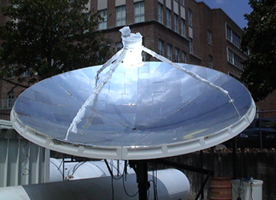 The solar-thermal tri-generation system is
designed to address the high-energy costs associated with
power production, refrigeration, and heating in lesser
developed areas or emergency situations. Our system at ESC
is currently in the testing process for power generation,
refrigeration, and water heating; it consists of a
concentrating solar concentrator and a thermal receiver.
The solar concentrator is of the parabolic dish type,
which is covered with a reflective aluminized mylar. This
focuses the sun’s rays onto the receiver mounted at the
focal point of the concentrator. The extreme temperatures
created at the focal region, in excess of 650C, is then
transferred by the receiver to heat a circulating fluid,
which is then transported elsewhere for various thermal
uses. For power production, the working fluid is water,
which is flashed to steam. This high-temperature,
high-pressure steam is then expanded through a small
high-speed turbine coupled with a generator for electric
power production. The exhaust steam is then condensed
before reentering the system so as to minimize working
fluid losses and increase system efficiency by preheating
the working fluid. For refrigeration and water heating, an
ethylene-glycol mixture is used. The ethylene-glycol
mixture is used as a thermal transport medium to transfer
the heat from the receiver to a thermal reservoir. For
refrigeration, the thermal reservoir is used in
conjunction with an anhydrous-ammonia refrigeration cycle.
This cycle is similar to the conventional refrigeration
cycle, however, instead of the refrigerant being
compressed by the work of a shaft from an electric
compressor, it is pressure driven by the addition of heat,
thus making off-grid refrigeration plausible. For water
heating, a heat exchanger is used in the thermal storage
reservoir. Instead of water being heated by an electric
heating element, the heat will be transferred from the
thermal reservoir to the water. Ideally, all three
components for the system will be able to operate
simultaneously for tri-generation in areas where off-grid
availability is essential.
The solar-thermal tri-generation system is
designed to address the high-energy costs associated with
power production, refrigeration, and heating in lesser
developed areas or emergency situations. Our system at ESC
is currently in the testing process for power generation,
refrigeration, and water heating; it consists of a
concentrating solar concentrator and a thermal receiver.
The solar concentrator is of the parabolic dish type,
which is covered with a reflective aluminized mylar. This
focuses the sun’s rays onto the receiver mounted at the
focal point of the concentrator. The extreme temperatures
created at the focal region, in excess of 650C, is then
transferred by the receiver to heat a circulating fluid,
which is then transported elsewhere for various thermal
uses. For power production, the working fluid is water,
which is flashed to steam. This high-temperature,
high-pressure steam is then expanded through a small
high-speed turbine coupled with a generator for electric
power production. The exhaust steam is then condensed
before reentering the system so as to minimize working
fluid losses and increase system efficiency by preheating
the working fluid. For refrigeration and water heating, an
ethylene-glycol mixture is used. The ethylene-glycol
mixture is used as a thermal transport medium to transfer
the heat from the receiver to a thermal reservoir. For
refrigeration, the thermal reservoir is used in
conjunction with an anhydrous-ammonia refrigeration cycle.
This cycle is similar to the conventional refrigeration
cycle, however, instead of the refrigerant being
compressed by the work of a shaft from an electric
compressor, it is pressure driven by the addition of heat,
thus making off-grid refrigeration plausible. For water
heating, a heat exchanger is used in the thermal storage
reservoir. Instead of water being heated by an electric
heating element, the heat will be transferred from the
thermal reservoir to the water. Ideally, all three
components for the system will be able to operate
simultaneously for tri-generation in areas where off-grid
availability is essential.